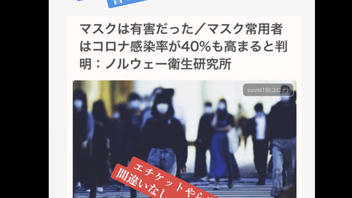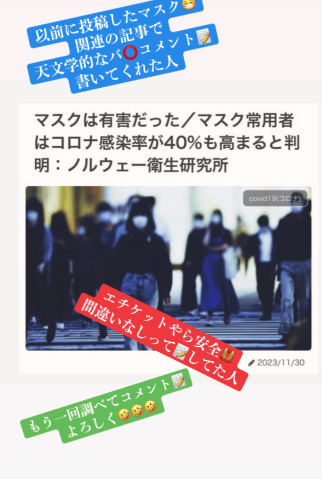
Does a recent study prove that wearing a mask actually increases the risk of coronavirus infection? No, that's not true: While part of a study suggests that those who wear masks are more likely to get infected with coronavirus, its own authors describe their work as "observational" and urge readers to use "caution" when interpreting the results.
The claim appeared in a video (archived here) on TikTok on December 2, 2023. The video states (translated from Japanese into English by Lead Stories staff):
Wearing a mask is harmful. The Norwegian Institute of Public Health has found that regular mask users are 40% more likely to become infected with the coronavirus.
This is what the post looked like on TikTok at the time of writing:

(Source: TikTok screenshot taken on Tue Dec 5 03:58:04 2023 UTC)
The sentence shown in the TikTok -- that mask users are 40 percent more likely to become infected with the coronavirus -- does not reflect the study's conclusions. "Association Between Face Mask Use and Risk of SARS-CoV-2 Infection: Cross-sectional study," published online by Cambridge University Press on November 13, 2023, urged caution when interpreting the results of observational studies, adding that more trials and studies are needed to understand how effective face masks can protect against respiratory pathogens.
We found that the incidence of self-reported COVID-19 was 33% (aRR 1.33; 95% CI 1.03-1.72) higher in those wearing face masks often or sometimes, and 40% (aRR 1.40; 95% CI 1.08-1.82) higher in those wearing face masks almost always or always, compared to participants who reported wearing face masks never or almost never. ...
We believe the observed increase in the incidence of infection associated with wearing a face mask is likely due to unobservable and hence nonadjustable differences between those wearing and not wearing a mask. Observational studies reporting on the relationship between face mask use and risk of respiratory infections should be interpreted cautiously, and more randomized trials are needed.
It added:
More randomized trials or quasi-experimental studies are needed to improve our insights on the effectiveness of face masks for protection against the transmission of respiratory pathogens.
Masks are very effective in preventing people from spreading droplets and their use is recommended. These particles may be spread when an infected individual talks, sings, shouts, coughs or sneezes, even if not symptomatic.
The World Health Organization recommends using masks to help protect against COVID-19, even though it underlines their use alone is not enough:
Masks should be used as part of a comprehensive strategy of measures to suppress transmission and save lives; the use of a mask alone is not sufficient to provide an adequate level of protection against COVID-19.
If COVID-19 is spreading in your community, stay safe by taking some simple precautions, such as physical distancing, wearing a mask, keeping rooms well ventilated, avoiding crowds, cleaning your hands, and coughing into a bent elbow or tissue. Check local advice where you live and work. Do it all!














